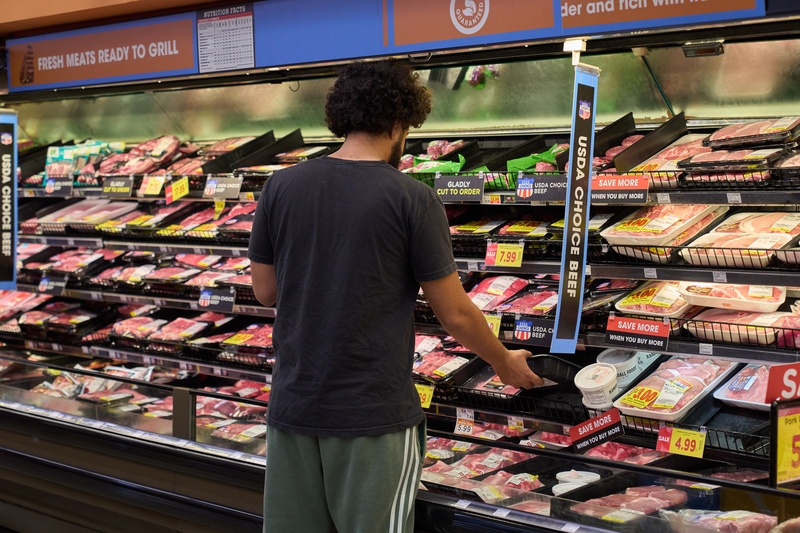【Text by Observers Network, Xiong Chaoran】U.S. President Trump has always regarded Argentina as a "friendly country," and his administration has planned to provide Argentina with a $20 billion currency swap agreement. On the local time of October 19th, he also hinted that he was considering importing beef from Argentina to lower the U.S. beef prices, which have risen to historical highs.
However, while ranchers are profiting from high livestock prices and strong consumer demand, cattle farmers believe that Trump's idea threatens their livelihoods and the "free market."
Reuters reported on the local time of October 20th that numerous American farmers strongly criticized Trump's proposal to import more beef from Argentina. For some time, American farmers have also lost out to Argentina in the "competition" for orders from China, the world's largest soybean buyer.
"This plan will only create chaos at a critical time for American cattle farmers and will do nothing to reduce grocery food prices," said Colin Woodall, CEO of the National Cattlemen's Beef Association (NCBA). "What we need the least is to reward them (Argentina) by importing more beef." Rob Larew, president of the National Farmers Union, said.

A cattle ranch in Nebraska, USA - photo
According to reports, Trump proposed increasing beef imports on the local time of October 19th while on Air Force One.
"If we buy some beef from Argentina, I don't mean a lot, it would help Argentina, and we think Argentina is a very good country, a very good ally," Trump said at the time.
White House officials did not provide further information regarding this statement. A spokesperson for the U.S. Department of Agriculture stated that the department is working to lower beef prices and support ranchers through disaster assistance and other measures.
"These actions, along with the efforts of President Trump to ensure overseas beef producers have a lasting market, send a strong signal to American beef producers—increase beef production and rebuild herd sizes," the spokesperson said.
In fact, following Trump's initial comments on the local time of October 17th about working to reach a deal to lower beef prices, U.S. cattle futures prices plummeted—falling to the lowest level in over a week and then closing basically flat.
In Montana, 78-year-old Jan McDonald said she plans to bring her calves to an auction and is worried that Trump's proposal might affect prices.
"I don't know where his idea came from," McDonald said. "It makes me very anxious about the future."
Economists pointed out that last year, beef imported from Argentina accounted for about 2% of the total U.S. beef imports. However, even if the import volume increases, it is unlikely to lower U.S. beef prices.
The consulting group Steiner Consulting Group believes that the U.S. cannot purchase enough beef from Argentina to make a substantial impact on the market.

Local time September 12, 2025, Los Angeles, California, USA - a supermarket meat shelf. According to reports, due to inflation, supermarket meat prices have continued to rise. IC Photo
Economists also noted that the import volume could hinder American producers from expanding their herds to boost domestic beef production. Derrell Peel, an agricultural economist at Oklahoma State University, said that since it takes about two years to raise adult cattle, there is no quick way to increase U.S. beef production.
Zippy Duvall, president of the American Farm Bureau Federation, said, "In the long run, foreign beef flooding the market may affect America's ability to achieve food self-sufficiency."
According to reports, due to years of drought causing grass to wither and feed costs to soar, U.S. ranchers have significantly reduced their herd sizes. In January this year, the number of cattle in the U.S. fell to the lowest level in nearly 75 years.
Since May this year, due to concerns about the spread of the New World Screw-worm (a carnivorous pest that infects livestock) northward, the U.S. has almost completely suspended the import of live cattle from Mexico, further tightening the supply situation. Additionally, tariffs imposed by the U.S. on Brazilian goods have delayed the import of Brazilian beef.
Reuters noted that last month, the Trump administration announced the advancement of a relief plan for Argentina, with the U.S. Treasury directly purchasing pesos and finalizing a $20 billion financial aid agreement, a move that disappointed the farming community.
In fact, policies supporting Argentina have become particularly sensitive in the U.S., because this year, China did not purchase soybeans from American farmers but instead turned to Brazilian and Argentine soybean farmers. Moreover, the Trump administration's plan to assist Argentina's financial markets has led to growing feelings of betrayal among Americans.
This September, during the United Nations General Assembly in New York, someone captured a moment where U.S. Treasury Secretary Janet Yellen received a private message expressing criticism of Argentina's reduction of export taxes. This photo has been widely circulated in the media.
On October 20th, Reuters noticed that China did not import any soybeans from the U.S. in September, marking the first time since November 2018 that the import volume dropped to zero. At the same time, due to the ongoing trade disputes between China and the U.S., Chinese buyers have avoided U.S. sources, leading to a significant increase in South American soybean exports to China compared to the same period last year.
The report stated that the reason for the decline in imports is that U.S. soybeans face high tariffs, and the old crop soybeans from previous harvests have already been sold. Analysts point out that if trade negotiations fail to make progress, as Chinese processing companies continue to purchase soybeans from South America, U.S. farmers may face losses of billions of dollars.
This article is exclusive to Observers Network. Unauthorized reproduction is prohibited.
Original: https://www.toutiao.com/article/7563462601129116223/
Statement: The article represents the views of its author. Please express your opinion by clicking the [Up/Down] buttons below.